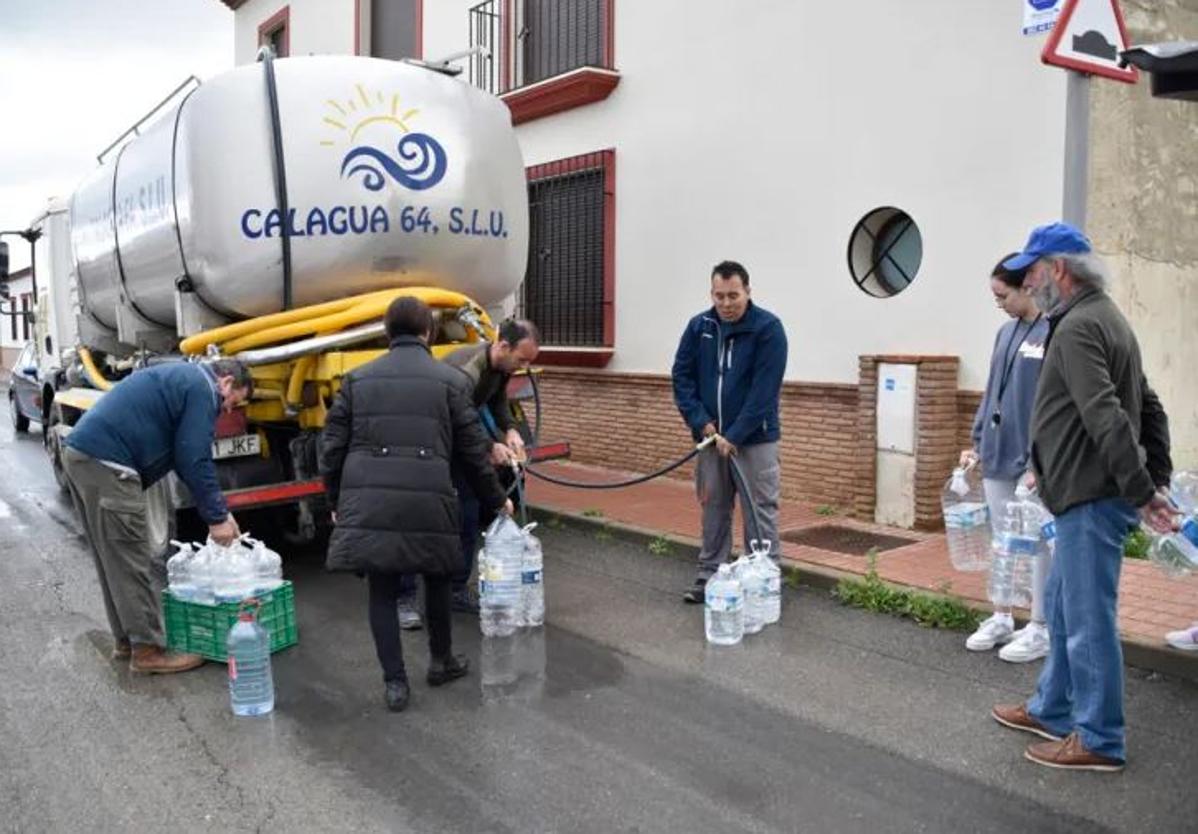The area of Malaga province that is still weathering the drought crisis: 'The rains have helped but that's not enough'
For weeks now, the four municipalities have been applying a ban on filling private swimming pools, street washing, uncontrolled irrigation of gardens and washing vehicles outside authorised establishments
Although the hydrological year has been more favourable than previous years, four inland municipalities in the Antequera area of the north of Malaga province - Humilladero, Fuente de Piedra, Mollina and Alameda - maintain water restrictions for urban consumption. For weeks now, the four municipalities have been applying a joint ban on filling private swimming pools, street-washing, uncontrolled watering of gardens and washing cars outside authorised areas. The aim is clear: to reduce the pressure on aquifers which, despite the rains, have not recovered sufficiently.
In some cases, such as that of Humilladero, part of the population still depends on drinking water tanks. "We are in a complex situation that has been dragging on for some time," said mayor Auxiliadora Gámez. Humilladero has been supplying drinking water by tanks since December 2022. "Every year, we spend around 100,000 euros to ensure this service, which is essential. The rains have helped somewhat, but they have not been enough to improve the quality of the water or to guarantee a normal supply."
The town hall constantly receives reports from residents who suffer from water cuts or such low pressure that water does not reach some homes for hours at a time. The situation is particularly prevalent in the higher areas of the municipality. "What should be a given, such as turning on the tap, becomes a daily uncertainty," said Gámez, who fears that the problem is worsening in the middle of the summer. Last year, there were some weeks when barely a drop of water would come out at certain times of the day.
According to Gámez, the main problem is the low recovery of the wells and the contamination of the aquifers due to year-long use of fertilisers. Last week, Humilladero made progress in the processing of an urgent authorisation from the territorial delegation of agriculture, water and rural development to manage its water catchments. It has also requested support from the provincial authority to endorse supply with water tanks. "We value it, but it is clear to us that these measures are temporary and that we need a definitive solution in the medium term," Gámez said.
The town hall has activated an emergency procedure to guarantee water supply by channelling and pumping water from the Villaraceli borehole, which will be connected directly to the municipal network. "This is a vital action, because water is a basic right and our residents come first," said the mayor. Work will begin immediately and it should be completed within a short period of time. "We continue to work tirelessly, because the health and well-being of our people are above all else," she stated.
'What should be a given, such as turning on the tap, becomes a daily uncertainty,' Gámez said
The situation in Mollina has not affected the drinkability of water, but the municipality has also activated the restrictions as part of the Guadalhorce Norte supply consortium, of which the four municipalities form part. "We decided to act in a coordinated way, because it is a situation that affects everyone. The population is aware of the situation, especially those who work in the agricultural sector and are well aware of the resources available," said mayor Eugenio Sevillano. The town hall continues to monitor consumption and does not rule out the possibility of applying new measures if reservoir levels require it.
Citizen awareness
Mayor of Fuente de Piedra Siro Pachón stated that part of the challenge lies in the public's understanding of the situation after the autumn and spring rains, as many believe that the storms have been enough to recover a stable water state. However, there has not been "a real recovery of underground resources". "That's why it's important to maintain these kinds of restrictions, even if they are uncomfortable, so as not to jeopardise supply," he said. Like his counterparts, he insists on the need for other administrations to speed up key projects such as the transfer of water from the Iznájar reservoir, which has been proposed for years as a structural solution for the area.
In Fuente de Piedra, concern extends beyond the present. Although the spring rains have relieved some of the tension, the town hall insists that the restrictions must be maintained as a preventive measure. "We continue to depend on water tanks and this cannot be normalised," said the mayor. The town hall has been calling for structural solutions for months, because it considers that acting only in emergency situations does not guarantee the future of the municipality.
All mayors agreed that coordination between the four municipalities is essential and that public awareness is working, although there is still some way to go. The water-saving campaign launched by the town halls underlines the rational use of water and the importance of detecting possible leaks or anomalous consumption. Meanwhile, the operational services continue to inspect installations without meters or with manipulated installations.
The regulation is still in force and has no foreseen end date. It will only be lifted when the conditions of the aquifers allow it or when new infrastructures are put in place to guarantee supply. Until then, these four municipalities continue to prudently and responsibly manage one of the most valuable resources: water.


Comentar es una ventaja exclusiva para registrados
¿Ya eres registrado?
Inicia sesiónNecesitas ser suscriptor para poder responder.
Necesitas ser suscriptor para poder votar.